Professional Development Module: Assertiveness Skills Assignment
VerifiedAdded on 2022/08/24
|8
|1234
|12
Homework Assignment
AI Summary
This assignment explores the concept of assertiveness, examining its importance in professional settings. It covers various techniques, including the five-stage response, active listening, and the broken record technique, to effectively communicate and express needs. The assignment delves into the reasons people say 'yes' when they mean 'no' and the consequences of this behavior, providing alternative ways to decline requests. It includes a thought diary to analyze personal reactions to unassertive situations, challenging negative thoughts and promoting more assertive thinking. The assignment also provides a matrix evaluating the ease of saying 'no,' giving compliments, expressing opinions, asking for help, expressing anger, affection, and stating rights with different groups of people. Overall, the assignment provides a comprehensive guide to developing and practicing assertiveness skills.

Running head
Name:
Institution:
Title
Name:
Institution:
Title
Paraphrase This Document
Need a fresh take? Get an instant paraphrase of this document with our AI Paraphraser
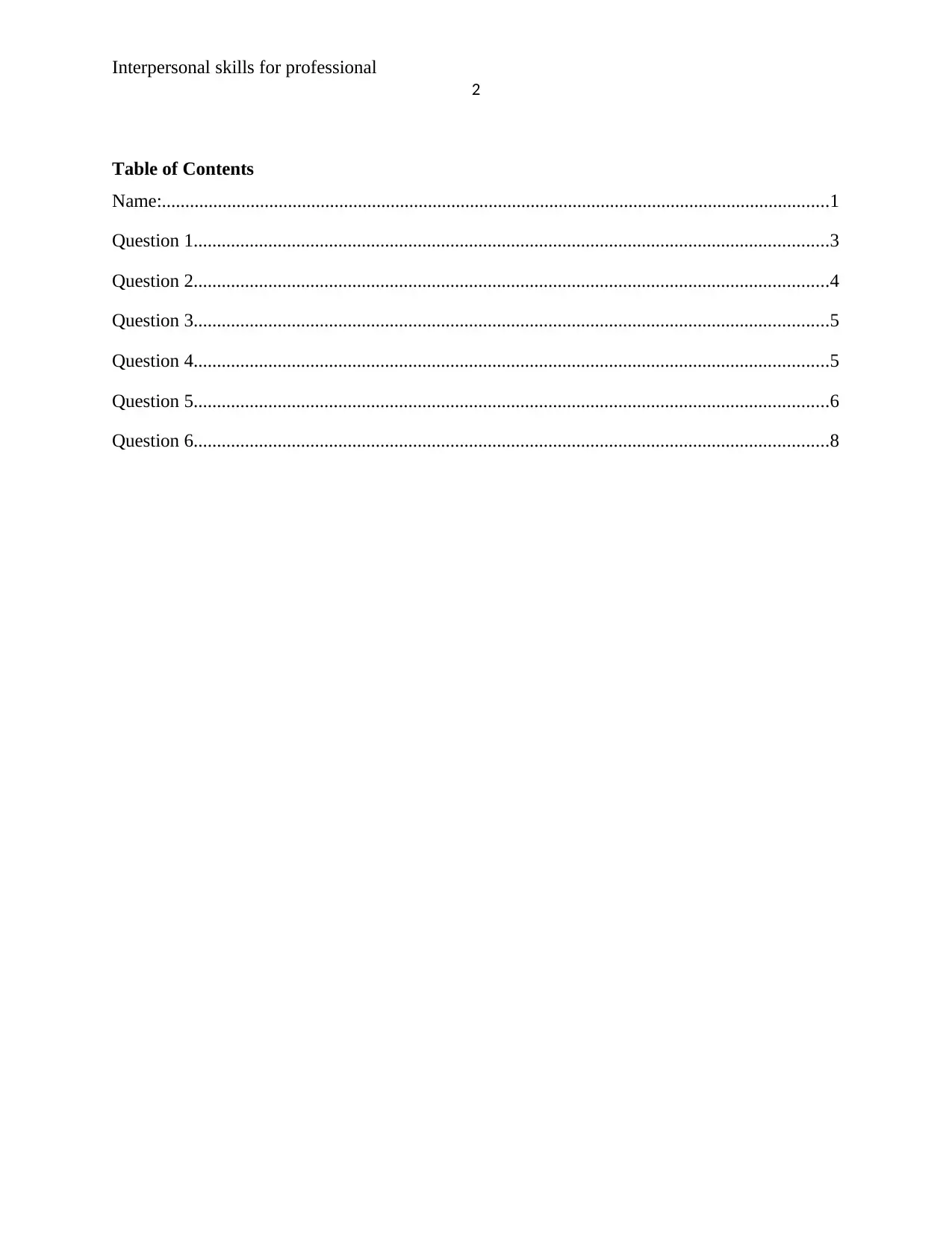
Interpersonal skills for professional
2
Table of Contents
Name:...............................................................................................................................................1
Question 1........................................................................................................................................3
Question 2........................................................................................................................................4
Question 3........................................................................................................................................5
Question 4........................................................................................................................................5
Question 5........................................................................................................................................6
Question 6........................................................................................................................................8
2
Table of Contents
Name:...............................................................................................................................................1
Question 1........................................................................................................................................3
Question 2........................................................................................................................................4
Question 3........................................................................................................................................5
Question 4........................................................................................................................................5
Question 5........................................................................................................................................6
Question 6........................................................................................................................................8
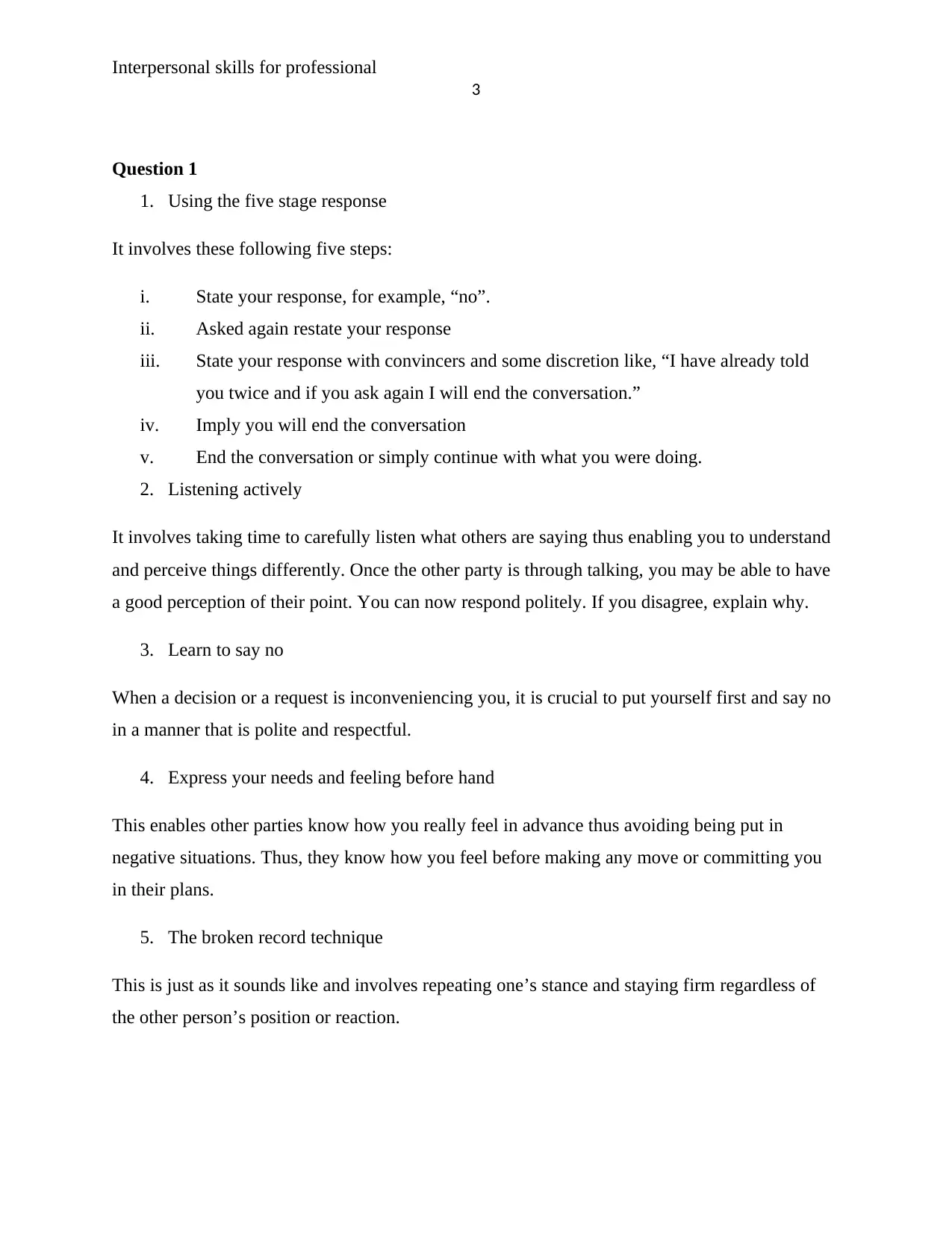
Interpersonal skills for professional
3
Question 1
1. Using the five stage response
It involves these following five steps:
i. State your response, for example, “no”.
ii. Asked again restate your response
iii. State your response with convincers and some discretion like, “I have already told
you twice and if you ask again I will end the conversation.”
iv. Imply you will end the conversation
v. End the conversation or simply continue with what you were doing.
2. Listening actively
It involves taking time to carefully listen what others are saying thus enabling you to understand
and perceive things differently. Once the other party is through talking, you may be able to have
a good perception of their point. You can now respond politely. If you disagree, explain why.
3. Learn to say no
When a decision or a request is inconveniencing you, it is crucial to put yourself first and say no
in a manner that is polite and respectful.
4. Express your needs and feeling before hand
This enables other parties know how you really feel in advance thus avoiding being put in
negative situations. Thus, they know how you feel before making any move or committing you
in their plans.
5. The broken record technique
This is just as it sounds like and involves repeating one’s stance and staying firm regardless of
the other person’s position or reaction.
3
Question 1
1. Using the five stage response
It involves these following five steps:
i. State your response, for example, “no”.
ii. Asked again restate your response
iii. State your response with convincers and some discretion like, “I have already told
you twice and if you ask again I will end the conversation.”
iv. Imply you will end the conversation
v. End the conversation or simply continue with what you were doing.
2. Listening actively
It involves taking time to carefully listen what others are saying thus enabling you to understand
and perceive things differently. Once the other party is through talking, you may be able to have
a good perception of their point. You can now respond politely. If you disagree, explain why.
3. Learn to say no
When a decision or a request is inconveniencing you, it is crucial to put yourself first and say no
in a manner that is polite and respectful.
4. Express your needs and feeling before hand
This enables other parties know how you really feel in advance thus avoiding being put in
negative situations. Thus, they know how you feel before making any move or committing you
in their plans.
5. The broken record technique
This is just as it sounds like and involves repeating one’s stance and staying firm regardless of
the other person’s position or reaction.
⊘ This is a preview!⊘
Do you want full access?
Subscribe today to unlock all pages.

Trusted by 1+ million students worldwide
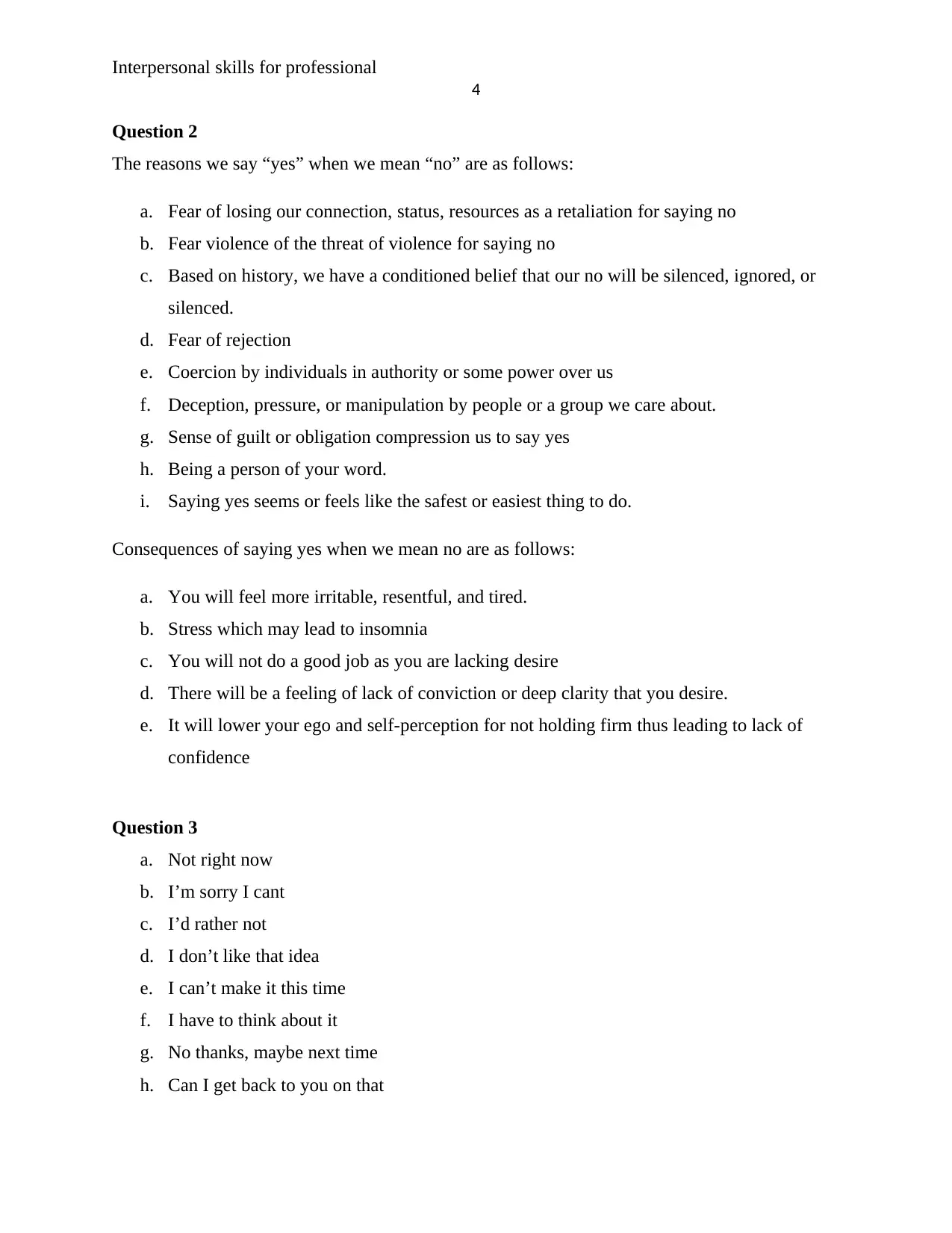
Interpersonal skills for professional
4
Question 2
The reasons we say “yes” when we mean “no” are as follows:
a. Fear of losing our connection, status, resources as a retaliation for saying no
b. Fear violence of the threat of violence for saying no
c. Based on history, we have a conditioned belief that our no will be silenced, ignored, or
silenced.
d. Fear of rejection
e. Coercion by individuals in authority or some power over us
f. Deception, pressure, or manipulation by people or a group we care about.
g. Sense of guilt or obligation compression us to say yes
h. Being a person of your word.
i. Saying yes seems or feels like the safest or easiest thing to do.
Consequences of saying yes when we mean no are as follows:
a. You will feel more irritable, resentful, and tired.
b. Stress which may lead to insomnia
c. You will not do a good job as you are lacking desire
d. There will be a feeling of lack of conviction or deep clarity that you desire.
e. It will lower your ego and self-perception for not holding firm thus leading to lack of
confidence
Question 3
a. Not right now
b. I’m sorry I cant
c. I’d rather not
d. I don’t like that idea
e. I can’t make it this time
f. I have to think about it
g. No thanks, maybe next time
h. Can I get back to you on that
4
Question 2
The reasons we say “yes” when we mean “no” are as follows:
a. Fear of losing our connection, status, resources as a retaliation for saying no
b. Fear violence of the threat of violence for saying no
c. Based on history, we have a conditioned belief that our no will be silenced, ignored, or
silenced.
d. Fear of rejection
e. Coercion by individuals in authority or some power over us
f. Deception, pressure, or manipulation by people or a group we care about.
g. Sense of guilt or obligation compression us to say yes
h. Being a person of your word.
i. Saying yes seems or feels like the safest or easiest thing to do.
Consequences of saying yes when we mean no are as follows:
a. You will feel more irritable, resentful, and tired.
b. Stress which may lead to insomnia
c. You will not do a good job as you are lacking desire
d. There will be a feeling of lack of conviction or deep clarity that you desire.
e. It will lower your ego and self-perception for not holding firm thus leading to lack of
confidence
Question 3
a. Not right now
b. I’m sorry I cant
c. I’d rather not
d. I don’t like that idea
e. I can’t make it this time
f. I have to think about it
g. No thanks, maybe next time
h. Can I get back to you on that
Paraphrase This Document
Need a fresh take? Get an instant paraphrase of this document with our AI Paraphraser
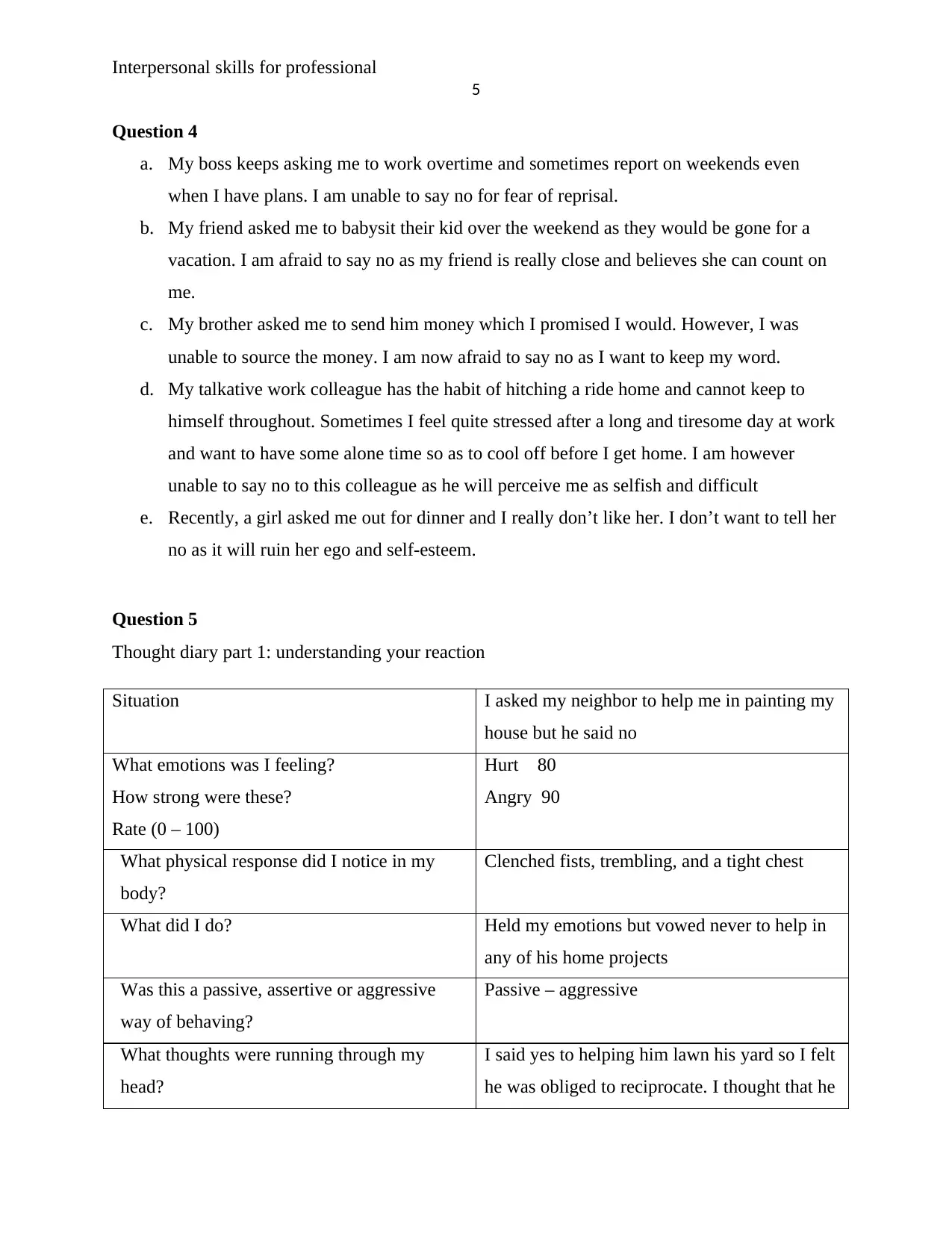
Interpersonal skills for professional
5
Question 4
a. My boss keeps asking me to work overtime and sometimes report on weekends even
when I have plans. I am unable to say no for fear of reprisal.
b. My friend asked me to babysit their kid over the weekend as they would be gone for a
vacation. I am afraid to say no as my friend is really close and believes she can count on
me.
c. My brother asked me to send him money which I promised I would. However, I was
unable to source the money. I am now afraid to say no as I want to keep my word.
d. My talkative work colleague has the habit of hitching a ride home and cannot keep to
himself throughout. Sometimes I feel quite stressed after a long and tiresome day at work
and want to have some alone time so as to cool off before I get home. I am however
unable to say no to this colleague as he will perceive me as selfish and difficult
e. Recently, a girl asked me out for dinner and I really don’t like her. I don’t want to tell her
no as it will ruin her ego and self-esteem.
Question 5
Thought diary part 1: understanding your reaction
Situation I asked my neighbor to help me in painting my
house but he said no
What emotions was I feeling?
How strong were these?
Rate (0 – 100)
Hurt 80
Angry 90
What physical response did I notice in my
body?
Clenched fists, trembling, and a tight chest
What did I do? Held my emotions but vowed never to help in
any of his home projects
Was this a passive, assertive or aggressive
way of behaving?
Passive – aggressive
What thoughts were running through my
head?
I said yes to helping him lawn his yard so I felt
he was obliged to reciprocate. I thought that he
5
Question 4
a. My boss keeps asking me to work overtime and sometimes report on weekends even
when I have plans. I am unable to say no for fear of reprisal.
b. My friend asked me to babysit their kid over the weekend as they would be gone for a
vacation. I am afraid to say no as my friend is really close and believes she can count on
me.
c. My brother asked me to send him money which I promised I would. However, I was
unable to source the money. I am now afraid to say no as I want to keep my word.
d. My talkative work colleague has the habit of hitching a ride home and cannot keep to
himself throughout. Sometimes I feel quite stressed after a long and tiresome day at work
and want to have some alone time so as to cool off before I get home. I am however
unable to say no to this colleague as he will perceive me as selfish and difficult
e. Recently, a girl asked me out for dinner and I really don’t like her. I don’t want to tell her
no as it will ruin her ego and self-esteem.
Question 5
Thought diary part 1: understanding your reaction
Situation I asked my neighbor to help me in painting my
house but he said no
What emotions was I feeling?
How strong were these?
Rate (0 – 100)
Hurt 80
Angry 90
What physical response did I notice in my
body?
Clenched fists, trembling, and a tight chest
What did I do? Held my emotions but vowed never to help in
any of his home projects
Was this a passive, assertive or aggressive
way of behaving?
Passive – aggressive
What thoughts were running through my
head?
I said yes to helping him lawn his yard so I felt
he was obliged to reciprocate. I thought that he
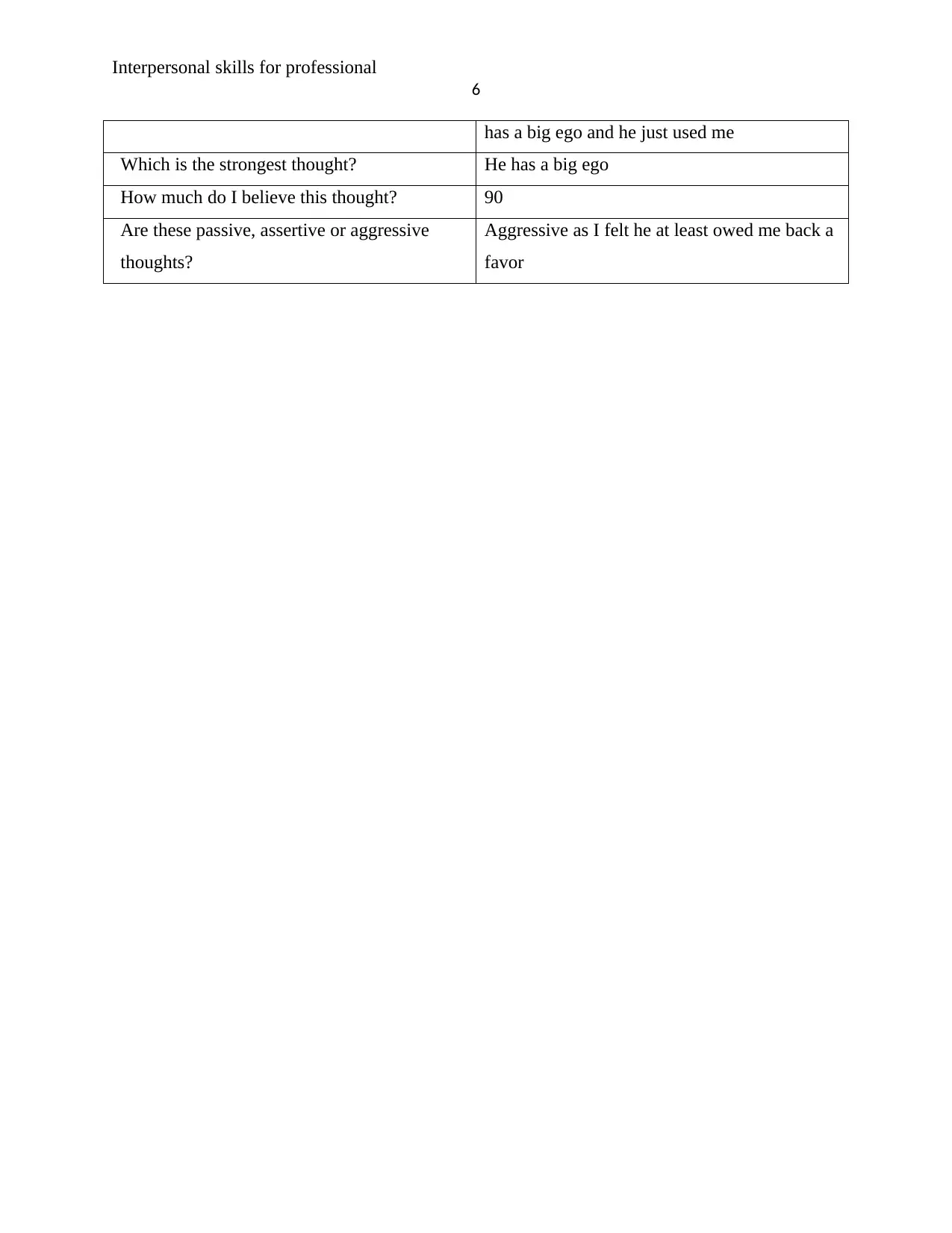
Interpersonal skills for professional
6
has a big ego and he just used me
Which is the strongest thought? He has a big ego
How much do I believe this thought? 90
Are these passive, assertive or aggressive
thoughts?
Aggressive as I felt he at least owed me back a
favor
6
has a big ego and he just used me
Which is the strongest thought? He has a big ego
How much do I believe this thought? 90
Are these passive, assertive or aggressive
thoughts?
Aggressive as I felt he at least owed me back a
favor
⊘ This is a preview!⊘
Do you want full access?
Subscribe today to unlock all pages.

Trusted by 1+ million students worldwide
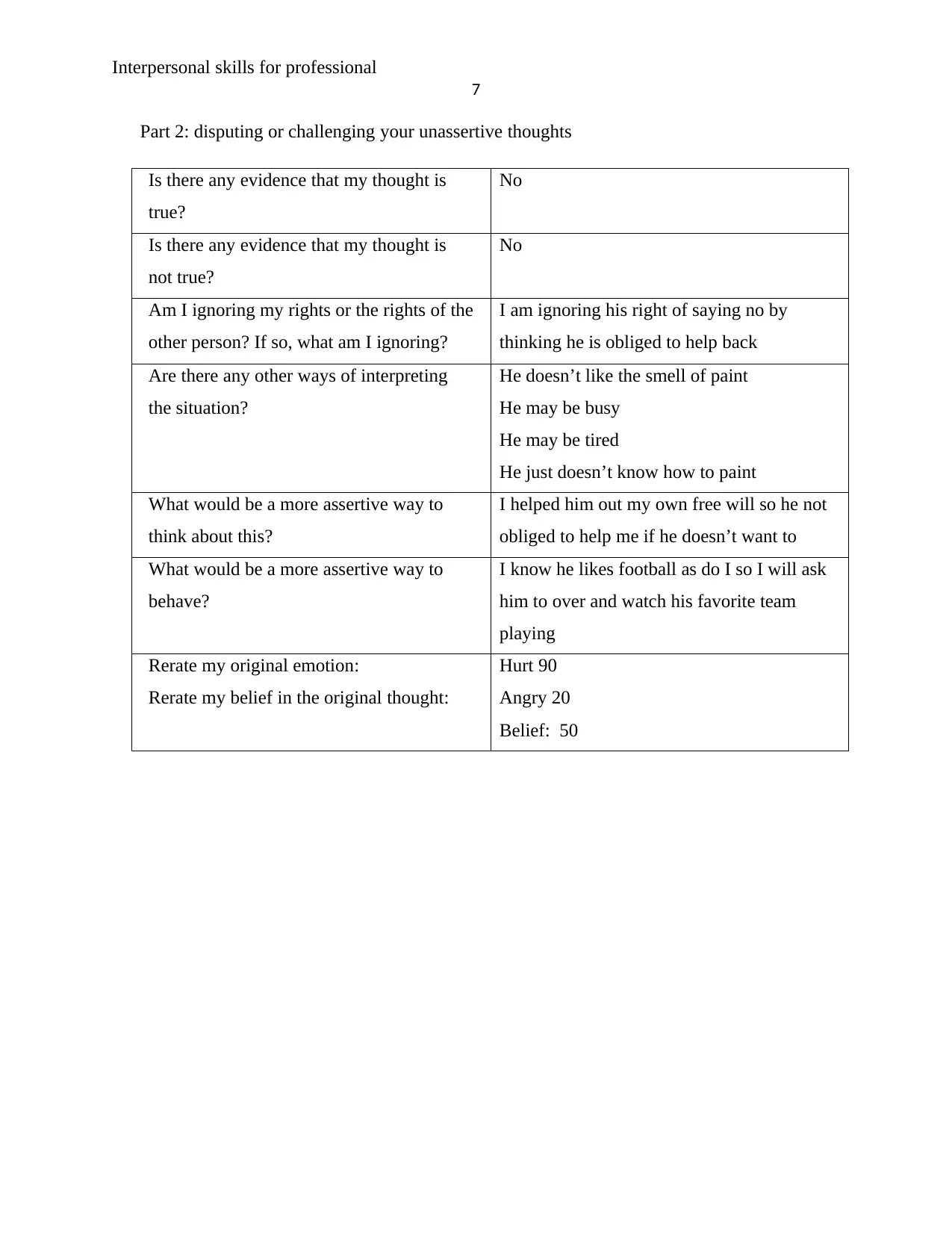
Interpersonal skills for professional
7
Part 2: disputing or challenging your unassertive thoughts
Is there any evidence that my thought is
true?
No
Is there any evidence that my thought is
not true?
No
Am I ignoring my rights or the rights of the
other person? If so, what am I ignoring?
I am ignoring his right of saying no by
thinking he is obliged to help back
Are there any other ways of interpreting
the situation?
He doesn’t like the smell of paint
He may be busy
He may be tired
He just doesn’t know how to paint
What would be a more assertive way to
think about this?
I helped him out my own free will so he not
obliged to help me if he doesn’t want to
What would be a more assertive way to
behave?
I know he likes football as do I so I will ask
him to over and watch his favorite team
playing
Rerate my original emotion:
Rerate my belief in the original thought:
Hurt 90
Angry 20
Belief: 50
7
Part 2: disputing or challenging your unassertive thoughts
Is there any evidence that my thought is
true?
No
Is there any evidence that my thought is
not true?
No
Am I ignoring my rights or the rights of the
other person? If so, what am I ignoring?
I am ignoring his right of saying no by
thinking he is obliged to help back
Are there any other ways of interpreting
the situation?
He doesn’t like the smell of paint
He may be busy
He may be tired
He just doesn’t know how to paint
What would be a more assertive way to
think about this?
I helped him out my own free will so he not
obliged to help me if he doesn’t want to
What would be a more assertive way to
behave?
I know he likes football as do I so I will ask
him to over and watch his favorite team
playing
Rerate my original emotion:
Rerate my belief in the original thought:
Hurt 90
Angry 20
Belief: 50
Paraphrase This Document
Need a fresh take? Get an instant paraphrase of this document with our AI Paraphraser
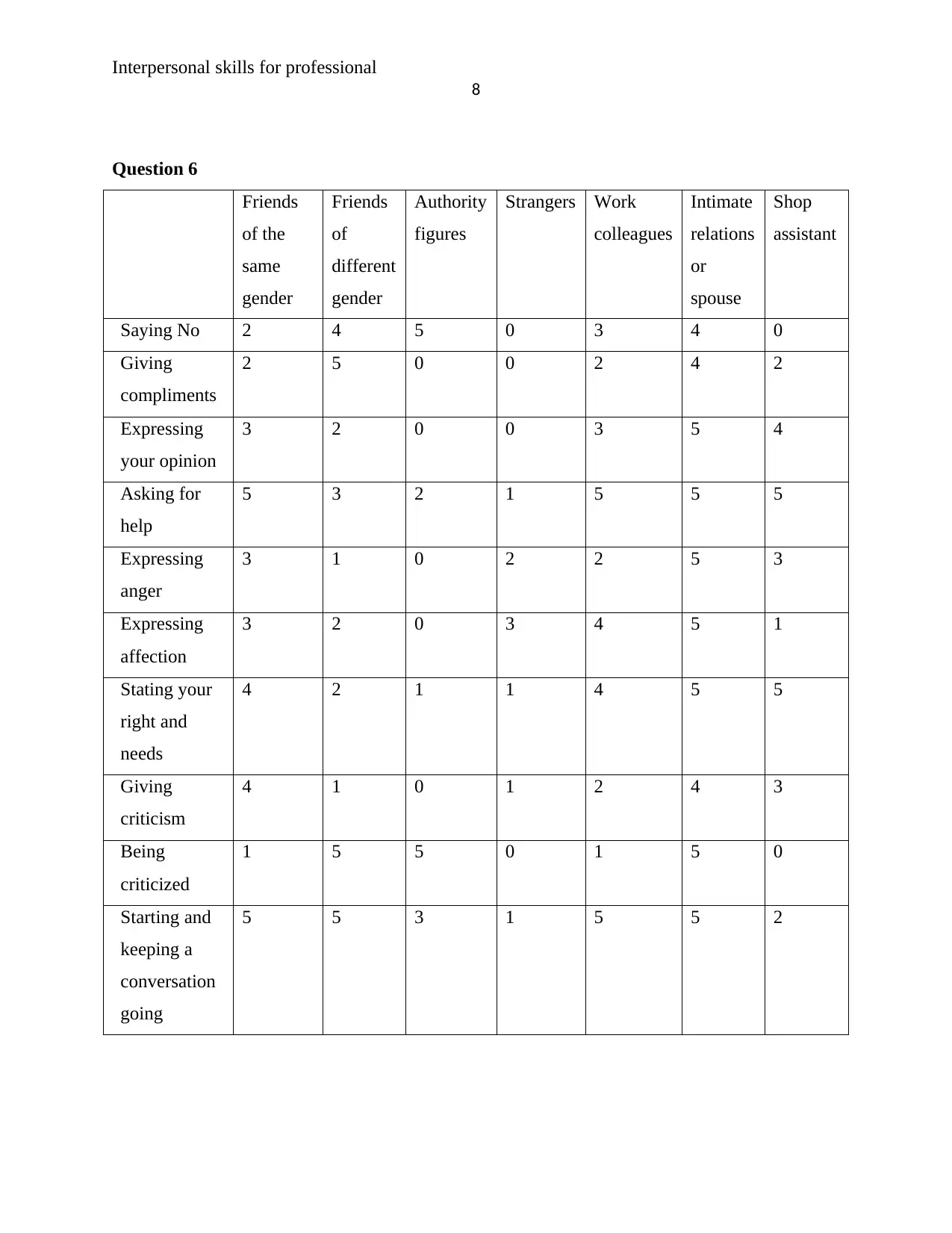
Interpersonal skills for professional
8
Question 6
Friends
of the
same
gender
Friends
of
different
gender
Authority
figures
Strangers Work
colleagues
Intimate
relations
or
spouse
Shop
assistant
Saying No 2 4 5 0 3 4 0
Giving
compliments
2 5 0 0 2 4 2
Expressing
your opinion
3 2 0 0 3 5 4
Asking for
help
5 3 2 1 5 5 5
Expressing
anger
3 1 0 2 2 5 3
Expressing
affection
3 2 0 3 4 5 1
Stating your
right and
needs
4 2 1 1 4 5 5
Giving
criticism
4 1 0 1 2 4 3
Being
criticized
1 5 5 0 1 5 0
Starting and
keeping a
conversation
going
5 5 3 1 5 5 2
8
Question 6
Friends
of the
same
gender
Friends
of
different
gender
Authority
figures
Strangers Work
colleagues
Intimate
relations
or
spouse
Shop
assistant
Saying No 2 4 5 0 3 4 0
Giving
compliments
2 5 0 0 2 4 2
Expressing
your opinion
3 2 0 0 3 5 4
Asking for
help
5 3 2 1 5 5 5
Expressing
anger
3 1 0 2 2 5 3
Expressing
affection
3 2 0 3 4 5 1
Stating your
right and
needs
4 2 1 1 4 5 5
Giving
criticism
4 1 0 1 2 4 3
Being
criticized
1 5 5 0 1 5 0
Starting and
keeping a
conversation
going
5 5 3 1 5 5 2
1 out of 8
Related Documents
Your All-in-One AI-Powered Toolkit for Academic Success.
+13062052269
info@desklib.com
Available 24*7 on WhatsApp / Email
![[object Object]](/_next/static/media/star-bottom.7253800d.svg)
Unlock your academic potential
Copyright © 2020–2026 A2Z Services. All Rights Reserved. Developed and managed by ZUCOL.





